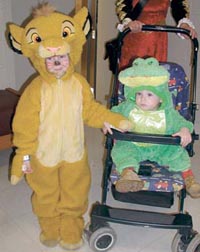Israelis prepare for Purim festival
Kids dressed up as cowboys, action heroes, princesses and biblical characters flooded the streets of Israeli cities Monday, beginning the celebration of the festival of Purim but the men and women wearing soldiers' uniforms were for real, patrolling amid warnings of terror attacks during the holiday. The holiday commemorates a turnabout by Jews against a powerful enemy in ancient Persia, and turnabout is the key to the celebration. Costumes symbolize changing identities, and there's even a biblical edict to drink alcohol until you can't distinguish between the Purim villain, Haman, and the hero, Mordechai.

Taking the idea of overdoing it literally, a bakery produced a huge, three-cornered date-filled pastry associated with Purim. The half-ton "hamentaschen," Yiddish for "Haman's hat," contained 400 eggs, about 300 kilograms (440 pounds) of flour and about 150 kilograms (330 pounds) of dates. It was baked in sections and pieced together, said Vered Braun, a spokeswoman for Angel Bakery in Jerusalem.
Purim is a one-day festival, but in keeping with the outsized spirit of the holiday, it actually lasts three days. Jewish holidays begin in the evening, and Purim eve is Monday, when Jews go to synagogue in costume to hear a festive reading of the story of the victory. On Tuesday, families exchange plates of candies, cookies and other goods in the image of giving charity and spreading cheer, and observant Jews conduct a formal Purim meal.
However, the instructions for the holiday say that walled cities must wait a day before marking Purim, meaning that cities like Jerusalem and Safed start on Tuesday evening and celebrate Wednesday. But people throwing Purim parties don't check the calendars that carefully, choosing any of the three days or more than one for a bash.
Another feature of Purim is a parade of kids and adults in costumes, traditionally held in several cities. While they are scenes of joy for the participants and onlookers, they present a challenge for security forces. With intelligence reports of dozens of terror attacks in the planning and active stages, police and military patrols have been reinforced, and Palestinians from the West Bank and Gaza have been banned from entering Israel at least until Wednesday.
Purim celebrations have been targets in the past, including four attacks in 1996 that killed 57 people. On Purim in 1994, a Jewish settler killed 29 Palestinians at a disputed holy site in the West Bank city of Hebron, turning the holiday into a target for revenge attacks.
Most Israelis preparing for the holiday went about their shopping and other activities Monday without paying much attention to the extra security. Stores overflowed with candy-filled Purim baskets and masks and costumes. "We never worry," said 22-year-old Ron Ward, shopping for Purim costumes with his girlfriend in Jerusalem's outdoor pedestrian mall. "It's no fun if you worry." Nearby, two policemen stopped people at random to X-ray their bags.
At an ice rink set up especially for Purim, skaters had to pass through two security checks. In a country with only one permanent skating rink, renting skates and paying about $6 to zoom around this oval of ice under a tent for half an hour proved to be a popular activity. "I think it's a wonderful idea," said Norma Barash, of Jerusalem, watching her grandchildren skate. "The (terror) warnings don't stop me from doing anything, but I think subconsciously everyone worries about it", reports the AP.
N.U.
Subscribe to Pravda.Ru Telegram channel, Facebook, RSS!


